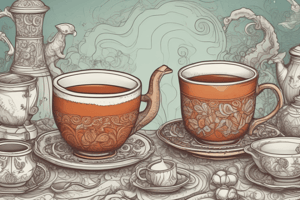Podcast
Questions and Answers
What is the difference between Oolong and Pu-erh teas?
What is the difference between Oolong and Pu-erh teas?
Oolong tea is partially oxidized, while Pu-erh tea can be post-fermented or raw.
Name two health benefits of drinking green tea.
Name two health benefits of drinking green tea.
Antioxidant and anti-inflammatory properties.
What distinguishes herbal teas from other tea varieties?
What distinguishes herbal teas from other tea varieties?
Herbal teas do not originate from the Camellia sinensis plant.
What gives Pu-erh tea its unique flavor and character?
What gives Pu-erh tea its unique flavor and character?
Describe the cultural significance of tea around the world.
Describe the cultural significance of tea around the world.
What are some examples of herbal teas mentioned in the text?
What are some examples of herbal teas mentioned in the text?
What is the main difference between black tea and green tea?
What is the main difference between black tea and green tea?
Who is credited with discovering the invigorating properties of tea in ancient China?
Who is credited with discovering the invigorating properties of tea in ancient China?
What role did the British East India Company play in the popularization of tea in Europe?
What role did the British East India Company play in the popularization of tea in Europe?
What are some examples of well-known black teas?
What are some examples of well-known black teas?
When did the earliest records of tea consumption date back to?
When did the earliest records of tea consumption date back to?
How many main varieties of tea are mentioned in the text?
How many main varieties of tea are mentioned in the text?
Flashcards are hidden until you start studying
Study Notes
Unraveling the alluring world of tea
Tea is an ancient beverage, a simple mixture of water and leaves from the Camellia sinensis plant, yet it's interwoven with complex flavors, fascinating histories, and diverse customs. In this exploration, we'll examine the roots of this humble drink, the many varieties that make up the tea family, and its enduring impact on global cultures.
Origins and Evolution
The earliest records of tea consumption date back around 2737 BCE in ancient China, when the emperor Shennong, considered the father of Chinese medicine, is said to have discovered its invigorating properties after a tea leaf fell into his boiling water. Tea then spread to other parts of Asia, with the British East India Company playing a pivotal role in popularizing the drink in Europe in the 17th century.
Today, there are thousands of tea varieties, each offering a unique taste profile, from the classic black and green varieties to white, oolong, and pu-erh teas, along with herbal infusions and blends, which don't originate from the Camellia sinensis plant.
Black and Green Teas
Black tea is the most widely consumed type worldwide, produced by fully oxidizing the leaves. The darker color and richer, more robust flavor result from the oxidation process. Well-known black teas include Assam, Darjeeling, and Ceylon.
Green tea, on the other hand, is less oxidized, preserving its natural green color and delicate flavor. Green tea is popular in Asia, especially in China and Japan, and is consumed for its numerous health benefits, such as antioxidant and anti-inflammatory properties.
Oolong and Pu-erh Teas
Oolong tea is a partially oxidized variety, offering a flavor that lies between black and green teas. Oolong teas are known for their complex taste and aroma, and are particularly popular in China.
Pu-erh tea is a unique variety that can be either post-fermented (ripe) or raw (young sheng). Pu-erh tea is known for its earthy, aged flavor and ability to improve with age. The tea leaves undergo a microbial fermentation process that gives it a distinct character.
Herbal Teas and Blends
Herbal teas and blends are a diverse group of infusions that do not originate from the Camellia sinensis plant. These include flowers, fruits, roots, herbs, and spices, which are steeped in water to create a flavorful beverage. Examples of herbal teas include chamomile, peppermint, and ginger. Blends are also popular, combining various tea varieties and other ingredients to create a unique taste profile.
Tea Culture and Customs
Tea has a rich cultural significance around the world. From the elaborate tea ceremony of Japan to the afternoon tea tradition in Britain, tea is more than just a beverage; it's a means of connection, relaxation, and social engagement. Tea houses and cafés have sprung up all over the globe, offering a space for people to come together and share in the pleasures of their favorite brew.
Health Benefits
Tea contains numerous beneficial compounds, including caffeine, antioxidants, and other nutrients. Drinking tea can provide a range of health benefits, from boosting energy and cognitive function to aiding digestion and reducing inflammation.
As you've learned, tea is a versatile and fascinating beverage that transcends cultures and has a rich history. Whether you're sipping on a steaming cup of black tea in the morning or enjoying an herbal blend at the end of the day, there's always something new to discover in the world of tea.
Studying That Suits You
Use AI to generate personalized quizzes and flashcards to suit your learning preferences.




